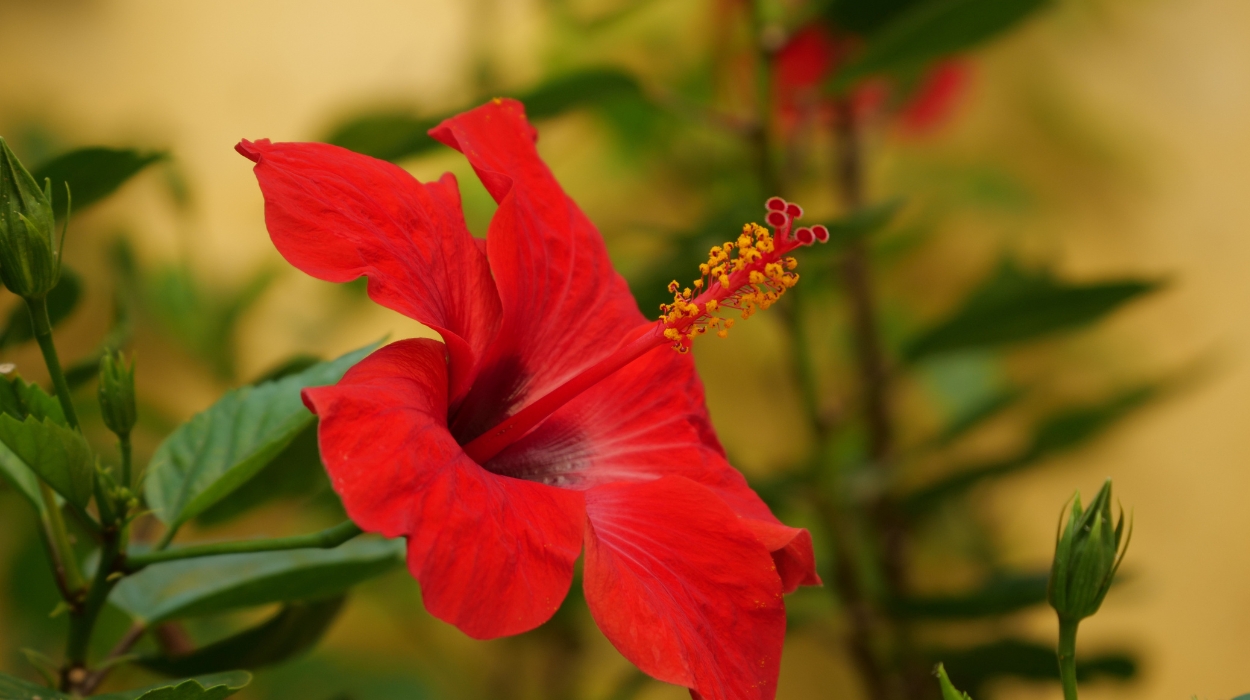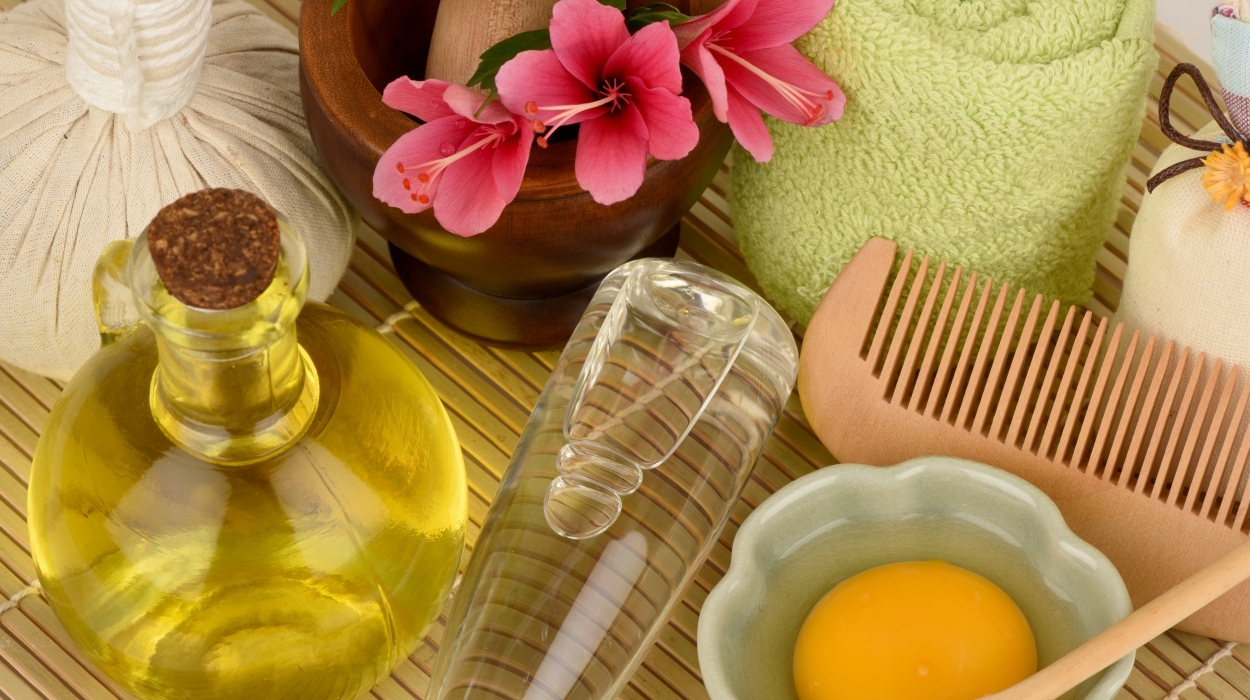 Expert's opinion
Expert's opinion
Expert's opinion
The article is a subjective view on this topic written by writers specializing in medical writing.
It may reflect on a personal journey surrounding struggles with an illness or medical condition, involve product comparisons, diet considerations, or other health-related opinions.
Although the view is entirely that of the writer, it is based on academic experiences and scientific research they have conducted; it is fact-checked by a team of degreed medical experts, and validated by sources attached to the article.
The numbers in parenthesis (1,2,3) will take you to clickable links to related scientific papers.
Hibiscus For Hair Growth: Benefits & Effective Ways To Use 2024

When it comes to natural hair growth oils and hair remedies, brightly flowering hibiscus plants often take the spotlight. Hibiscus offers a range of benefits for promoting healthy hair. From strengthening the hair shaft to stimulating growth and preventing hair loss, hibiscus has long been used in hair care practices.
Let’s explore the potential of hibiscus for healthy hair growth and the various ways to incorporate it into your hair care routine. Get ready to unlock the secrets of hibiscus and enhance your hair’s natural beauty.
Is Hibiscus Good For Hair Growth?
Yes, hibiscus can be beneficial for stimulating hair growth. It’s a rich source of vitamins, antioxidants, and nutrients that can nourish the scalp and strengthen hair follicle cells. Hibiscus can protect the scalp and hair from oxidative stress, prevent hair fall, and add shine to hair. Regularly using hibiscus-infused hair care products or incorporating hibiscus into hair masks can help improve hair regrowth from dormant hair follicles to achieve thicker, healthier hair.
Benefits Of Hibiscus For Hair

According to research,[1] hibiscus benefits hair due to its rich nutrients. Many vitamins, minerals, amino acids, and antioxidants help support healthier hair.
Promote Hair Growth
Hibiscus contains flavonoids and tannins,[2] which have been shown to stimulate hair growth. Studies in rats[3] and other animals have shown positive results for hair growth. Hibiscus leaves and flowers both have significant hair growth potential. However, its leaves had more positive effects than fresh hibiscus flowers. Still, more research is needed to see all the human hair growth potential.
Protect Hair
Hibiscus may promote and protect hair in multiple ways. Flavonoids in hibiscus can help make hair easier to comb by reducing frizz and static. They also leave hair feeling softer, with more shine. These things may help improve your hair’s overall appearance.
Hair structure and hair growth can both be affected by nutrition. Micronutrients like vitamin C[4] are essential for collagen production. Collagen is a natural protein that helps support skin health, which can translate to a healthy scalp and healthy hair. Incorporating hibiscus or a collagen supplement can help support beautiful, lush hair.
Deeply Conditions And Moisturizes
Hibiscus can be a powerful emollient that can help nourish hair and scalp. Hibiscus is also high in mucilage,[5] a natural moisturizer for hair. Healthy hair follicles mean healthier hair.
Prevent Dandruff
Extracts from the Malvaceae family have been used to treat dandruff since ancient times. Vitamin B helps regulate the flow of sebum, moisturizing the scalp and preventing dandruff. The natural antibacterial and antifungal properties can also combat an underlying cause of dandruff, a fungus trapped by oil on the scalp.
Regular use of hibiscus-based hair care products may keep the scalp clean and dandruff-free, improving the condition of the hair and scalp.
Strengthen Hair
Hibiscus is rich in vitamin C, which is vital in hair strengthening. Vitamin C is an antioxidant that helps combat damage to the hair follicles. Vitamin C deficiency[4] can affect iron absorption and contribute to hair loss. Incorporating hibiscus into your hair care routine can make your hair healthier and less prone to breakage or split ends.
Delay Premature Greying
Oxidative stress like UV exposure, inflammation, and environmental factors seem to play a role in hair follicle aging.[6] Hair greying is a natural part of aging. Premature greying, also called premature canities, may be prevented by compounds in hibiscus that help reduce oxidative stress.[7]
Which Part Of Hibiscus Is Used For Hair?
Several properties of hibiscus can promote healthy and lustrous hair, including the petals and the seeds. Here are five parts of the hibiscus plant that offer specific benefits to help enhance your locks.
Hibiscus Petals
A popular way to use hibiscus flowers is to steep the petals in hot water to create an herbal infusion. It can be used in hair masks and oils or as a final hair rinse after a mild shampoo.
Hibiscus Leaves
Hibiscus leaves are often ground and mixed with water and other herbs for hair, like rosemary, lavender, or fenugreek seeds, to create a paste. It can also be infused into oils or boiled to make a nutrient-rich hair rinse. Hibiscus leaves for hair are a versatile ingredient in homemade hair masks, herbal hair oils, and other hair care products.
Hibiscus Seeds
The seeds can be ground into a fine hibiscus powder and added to hair masks and hair oils to improve manageability and softness. Seeds from the okra plant, which are part of the hibiscus family, are known for their high mucilage[1] content. Mucilage can act as a natural conditioner and detangler for the hair.
Hibiscus Stem
Natural juices are often extracted from the hibiscus stem. Hibiscus juice may be applied directly to your scalp or mixed with other ingredients to create hair tonics or rinses.
Hibiscus Essential Oil
It is often diluted into carrier oils like coconut oil or hair care products.
How To Use Hibiscus For Your Hair Growth

Hibiscus Hair Mask
Create a nourishing hair mask by blending hibiscus flowers or petals with ingredients like yogurt, honey, fresh aloe vera gel, or coconut oil. Apply the mask to your scalp and hair, leave it on for 30 minutes, and rinse thoroughly. Use a mild shampoo and conditioner afterward.
Hibiscus Infused Oil
Infuse hibiscus flowers or petals in carrier oils like almond or coconut oil. Let the mixture sit in a cool, dark place for a few weeks, then strain the oil. Apply this infused hibiscus oil to your hair roots as a scalp oil massage or pre-wash treatment to condition and nourish your hair.
Hibiscus Tea Rinse
Brew hibiscus tea using dried flowers and let it cool. After shampooing your hair, pour the hibiscus tea over your hair roots as a final rinse. Drinking hibiscus tea also offers health benefits as well. Consider the many uses and benefits when deciding how much hibiscus tea per day to make.
Hibiscus Hair Tonic
Boil the hibiscus flower in water, strain the liquid, and allow it to cool. Transfer it into a spray bottle to use as a revitalizing hair tonic for your scalp, to help promote hair growth, and reduce hair fall. While some hair fall is considered normal, consider adding a treatment for hair loss if it becomes severe.
Hibiscus And Fenugreek Hair Masks
Grind fenugreek seeds and combine them with hibiscus paste or oil. Apply the mixture to your scalp and hair, let it sit for about 30 minutes, then rinse thoroughly. This combination harnesses the benefits of both hibiscus and fenugreek, promoting hair growth, preventing hair loss, and providing deep conditioning for healthier and more manageable hair.
Hibiscus Shampoo Or Conditioner
Look for commercial hair care products that contain hibiscus oil or hibiscus leaf extract. These specially formulated shampoos or conditioners can help nourish and strengthen hair follicles while providing the benefits of hibiscus.
Any Side Effects Of Hibiscus For Hair?
While hibiscus is considered generally safe for hair care, it’s important to follow these recommendations:
- Those who are allergic to the Malvaceae plant family should avoid using hibiscus.
- Use hibiscus-based products in moderation and observe how your hair responds to find the right balance.
- If you have any concerns or pre-existing scalp conditions, consult a dermatologist or healthcare professional before adding hibiscus to your hair care.
- As with any hair care products, perform a patch test before applying hibiscus products to the scalp or hair to check for any adverse reactions.
- Natural pigments from hibiscus can have a staining effect on natural hair color, especially lighter shades. If you have light or bleached hair, be cautious when using hibiscus-infused products to avoid undesired color changes.
- Certain medications may interact with hibiscus, particularly when consumed orally. If you take any medications, consult a healthcare professional before using hibiscus-based products for hair care.
Always use caution and consider your individual factors when adding herbal remedies to your hair care. If you have any concerns, you should check with a healthcare professional or dermatologist before using hibiscus.
Conclusion
Hibiscus proves to be a remarkable natural ingredient for keeping hair healthy and vibrant. Its rich nutrients, including amino acids, essential fatty acids, antioxidants, and vitamins, provide a slew of benefits. This widely accepted natural remedy can strengthen the hair strands, stimulate new hair growth, prevent hair loss, and improve overall hair health.
Whether you incorporate the leaves, petals, seeds, or essential oils into your hair care routine, the brightly-hued hibiscus flowers can work wonders for your locks. Embrace the power of hibiscus to unlock the extraordinary potential to transform your hair. Discover some of the beauty nature has to offer in the wonders of hibiscus for your hair.
+ 7 sources
Health Canal avoids using tertiary references. We have strict sourcing guidelines and rely on peer-reviewed studies, academic researches from medical associations and institutions. To ensure the accuracy of articles in Health Canal, you can read more about the editorial process here
- Nidhi Chaurasiya (2014). FORMULATION AND EVALUATION OF HERBAL HYDRO GEL FROM HIBISCUS ROSA-SINENSIS. [online] Available at: https://www.semanticscholar.org/paper/FORMULATION-AND-EVALUATION-OF-HERBAL-HYDRO-GEL-FROM-Chaurasiya/a7a87afc426e098473fb87638fc3996cf6a2206a.
- Imam Budi Putra, Nelva Karmila Jusuf and Imam Bagus Sumantri (2020). The Potency of Hibiscus rosa-sinensis Linn. Leaves Ethanol Extract as Hair Growth. [online] ResearchGate. Available at: https://www.researchgate.net/publication/341096283_The_Potency_of_Hibiscus_rosa-sinensis_Linn_Leaves_Ethanol_Extract_as_Hair_Growth.
- Laili Che Rose, Nur Nadiah, Nur and Hamdan Suhaimi (2020). Potential hair growth of crude extract from Hibiscus rosa-sinensis Linn. [online] ResearchGate. Available at: https://www.researchgate.net/publication/374447122_Potential_hair_growth_of_crude_extract_from_Hibiscus_rosa-sinensis_Linn.
- Almohanna, H.M., Ahmed, A.A., Tsatalis, J.P. and Tosti, A. (2018). The Role of Vitamins and Minerals in Hair Loss: A Review. Dermatology and Therapy, [online] 9(1), pp.51–70. doi:https://doi.org/10.1007/s13555-018-0278-6.
- R. Vignesh and Nair, B. (2018). EXTRACTION AND CHARACTERISATION OF MUCILAGE FROM THE LEAVES OF HIBISCUS ROSA-SINENSIS LINN. (MALVACEAE). [online] Available at: https://www.semanticscholar.org/paper/EXTRACTION-AND-CHARACTERISATION-OF-MUCILAGE-FROM-OF-Vignesh-Nair/9020e3e50ed2dcb28a0393011cb382f3586cb2d2.
- Deepashree Daulatabad, Singal, A., Grover, C., Sharma, S. and Neelam Chhillar (2015). Assessment of oxidative stress in patients with premature canities. International Journal of Trichology, [online] 7(3), pp.91–91. doi:https://doi.org/10.4103/0974-7753.167469.
- Guardiola, S. and Mach, N. (2014). Potencial terapéutico del Hibiscus sabdariffa: una revisión de las evidencias científicas. Endocrinología y Nutrición, [online] 61(5), pp.274–295. doi:https://doi.org/10.1016/j.endonu.2013.10.012.



